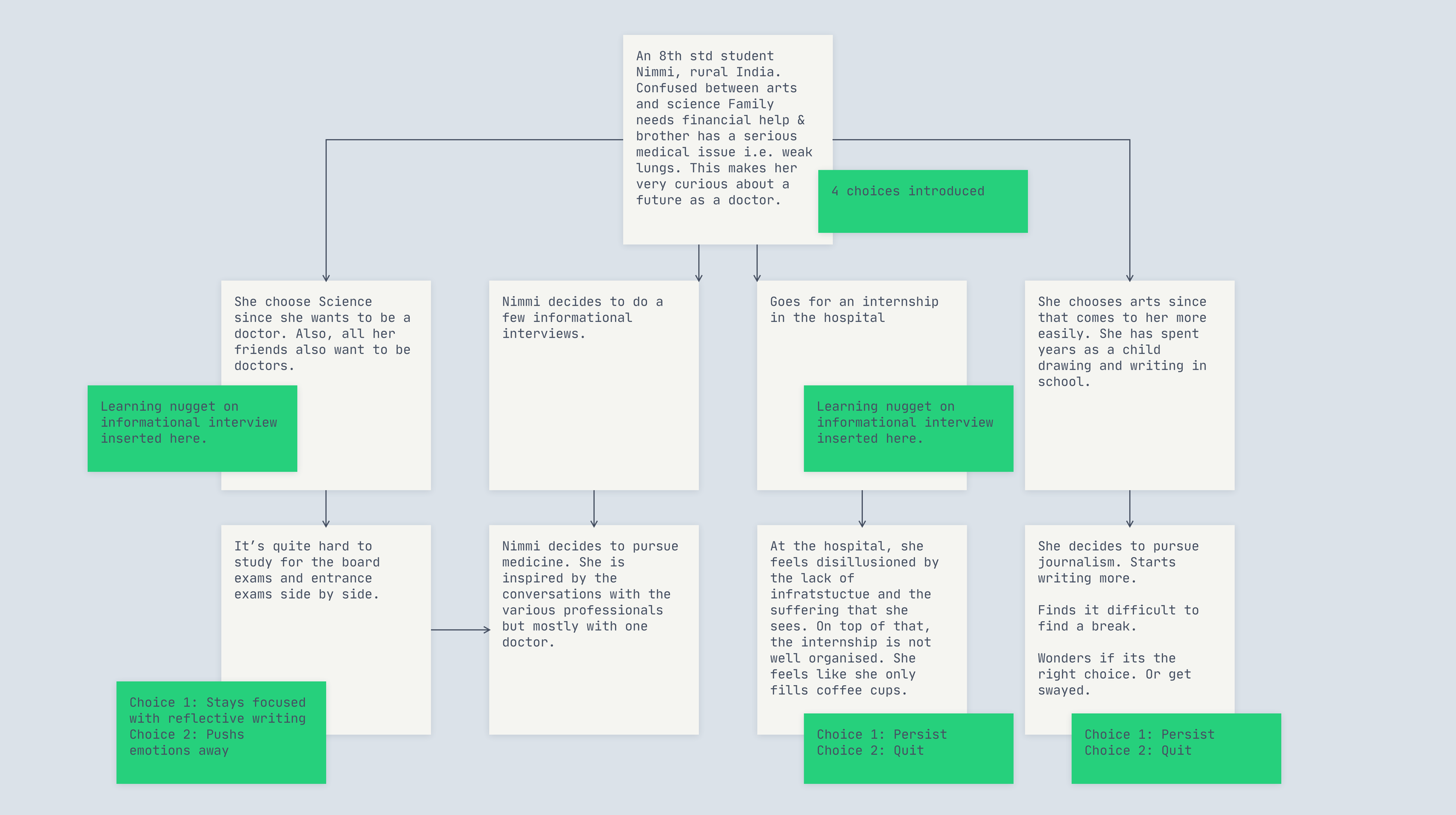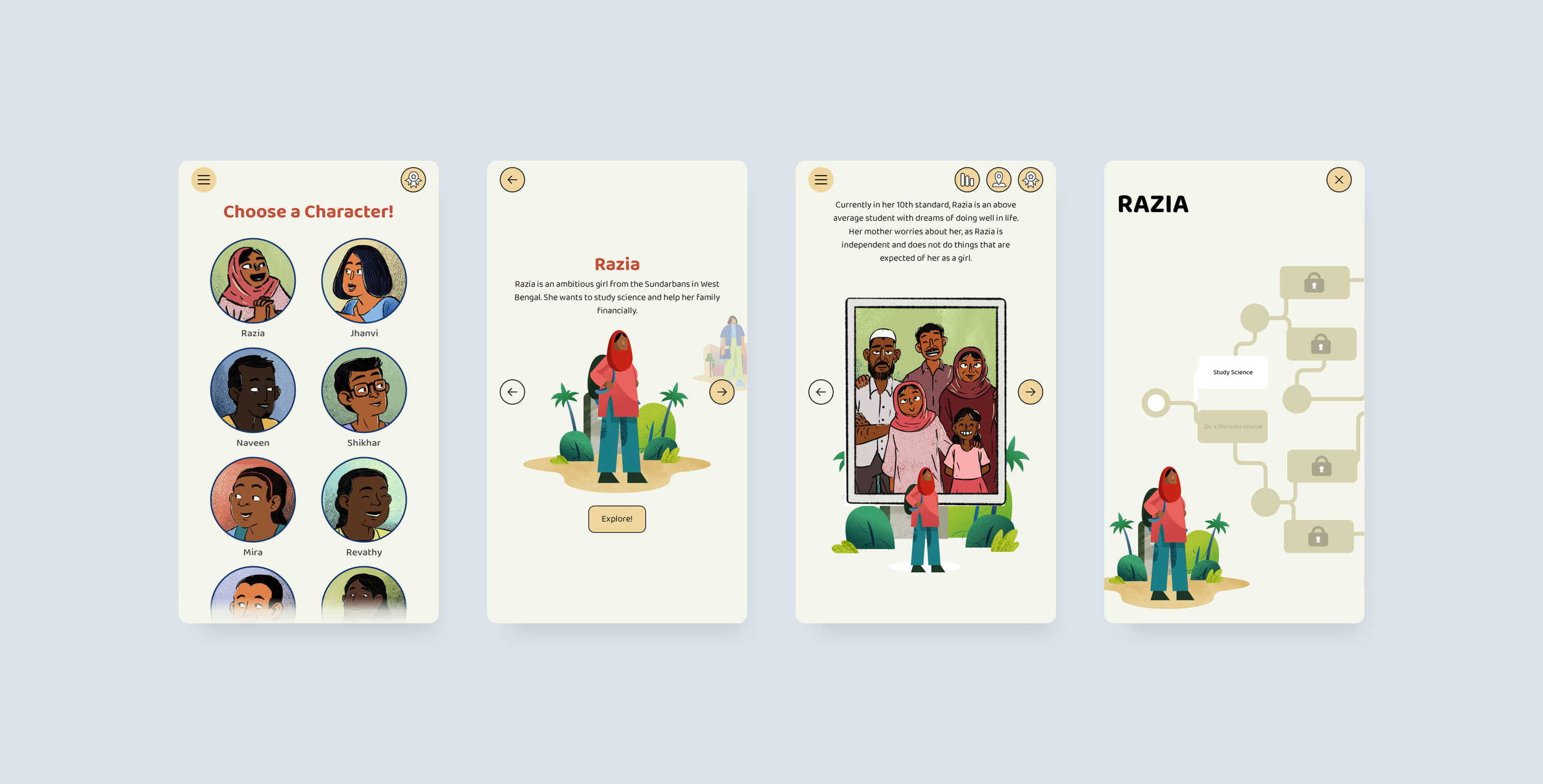
QUEST Alliance, 2021
Defining a game-based learning experience on career exploration
BACKGROUND
In 2021, with a continued pandemic refusing to die down, the STEM for Girls, Secondary School, Quest Alliance funded by IBM was in search of methods to continue to engage their learners. They approached us to define a game-based learning experience on career exploration.
With the objective of demonstrating and scaling up models that develop 21st-century skills in learners & educators, Quest Alliance have been endorsing self-learning and the effective use of education technology since 2005.
The organisation had a robust blended learning and self-paced mobile learning curriculum in place already. The urgent need now was to continue to engage learners through self-paced learning. They were keen to develop a game that would be supplementary to their existing resources.
KEY QUESTIONS
1.
The team had a robust set of resources on the topic already. What were the right focus and approach for self-paced learning?
2.
Given learners would access the game on shared mobile devices, how could the game be structured?
3.
How could the format of the game prompt metacognitive thinking toward career exploration?

APPROACH
Following our process of uncover-outline and exemplify, the project was kickstarted with a deeper dive into the program’s existing offerings. Immersing ourselves in the material to identify cues for digital transformation opportunities, we prepared research questions to ask the team members to learn from those who understood the program’s strengths and weaknesses the best. These interviews allowed us to see the program from their point of view. Consolidating our observations from the conversations, we generated insights that pointed to the core areas that the team could leverage towards the game. It was clear that as much as the curricular material was apt for developing the student’s career skills, the learners needed scaffolds to visualise how career development skills especially the skills that require an investment of time and money actually impact their life. We articulated specific goals for the experience and developed learning objectives to anchor the content that would be created in the project.
Mindmapping to immerse ourselves in the program material and identify opportunities for the self-paced game.
Working on the format of the game, we surveyed other learning games as probes with the Quest Alliance team to uncover the teams aspirations as well as their perspective about how it would fit their specific context. Armed with their perspective, we outlined three concepts that would fit the needs of the learning objectives as well as suit the content and use case well.
On presenting these concepts, the team and we deliberated the pros and cons. Finalising on the approach, we created the structure around the experience. We crafted a high-level map of the way the interactions of the game would flow. The theme lent itself well to using a mix of a branching style story with interactive choices. For the educational parts, learners would be provided with learning nuggets in the flow of the storytelling experience.
The theme lent itself well to using a mix of a branching style story with interactive choices.
While playing, we outlined the learners would be given points against three parameters. These would be leveraged to highlight the trade-offs people make while making various career decisions. There would also be the chance to be at a high-level overview of the story, to jump to other storylines to see how life may have progressed differently, thereby emphasizing the point about the multiple pathways in life, and how the various career skills impact how a character’s journey comes together.
The Quest Alliance team was also mindful of creating content that captured the stories of members across India. This meant that for the first roll-out, we planned to have a range of characters from diverse backgrounds. In collaboration with the team, we created a series of character sketches as well as three end-states for each character which were created as starting points to share with the production team. The intention was to represent as many religions presented in India, showcase stories from rural, urban and small towns as well as cover the spectrum of gender and ability.
A series of character sketches as well as three end-states for each character were created as starting points for the stories to share with the production team.
The character sketches translated into 8 final characters. This process was led by Ooloi Labs.
Snapshots of Career Quest 2.0
IMPACT
With the clarity of the game framework in place and an example narrative in hand, Quest Alliance onboarded Ooloi Labs to produce the experience. Through this process, we continued to support the game development in the capacity of review. Our goal was to ensure that as we took the game from strategy to specifics, we retained the vision while achieving the game’s goals and learning objectives. Today the game is being translated into six Indian languages. It will be rolled out in 2022 across India.





